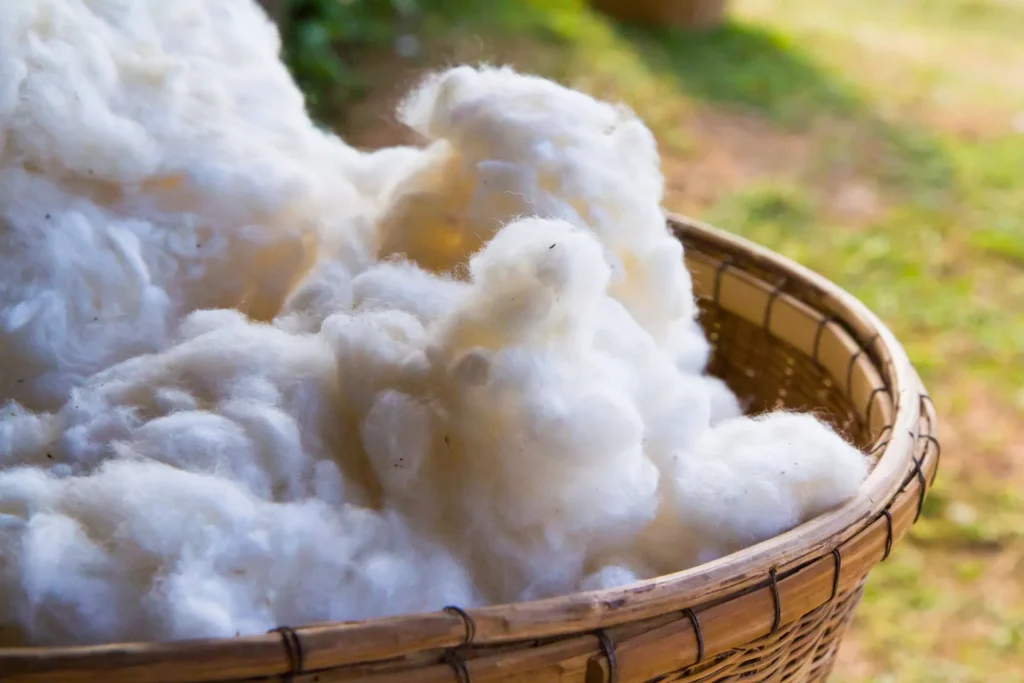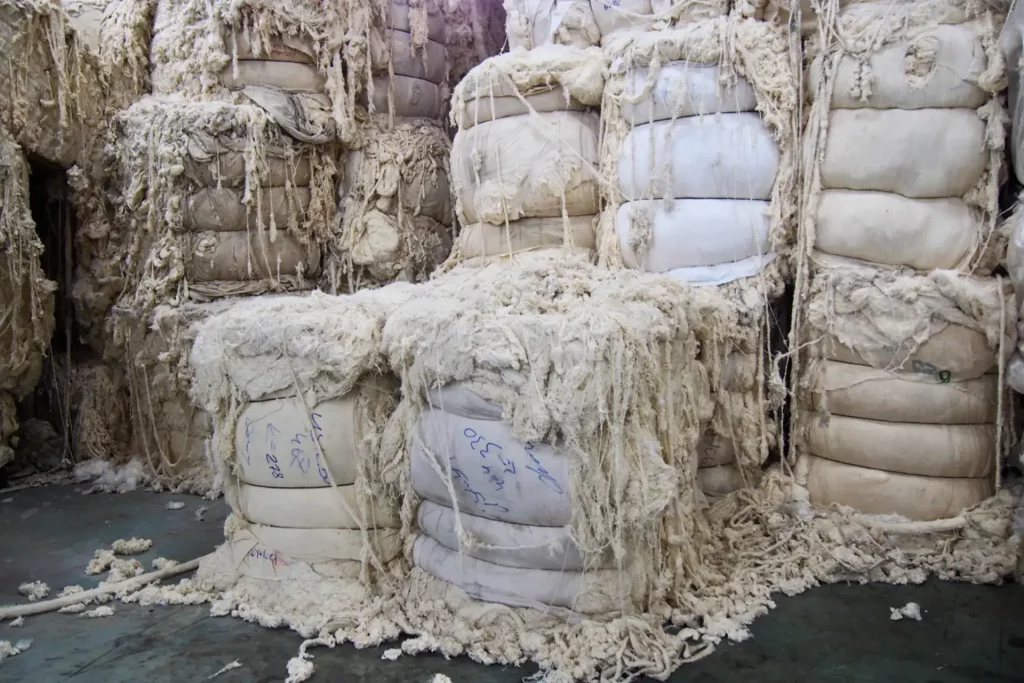As you stand in front of your closet, grappling with the guilt of fast fashion’s impact on the environment, you are not alone. The fashion industry’s carbon footprint is a glaring concern, and you, like many others, are on a quest for an eco-conscious alternative.
The struggle is real: you want to be kinder to the planet, but you also crave comfort, durability, and style. In the vast world of textiles, two contenders emerge—organic cotton and recycled cotton. These fabrics promise a path to guilt-free fashion, but which should you choose?
Our journey through the threads of sustainability begins here as we unravel the tale of organic and recycled cotton, revealing the possibilities of a wardrobe that harmonizes with nature. Join us as we navigate this textile crossroads and discover how your choices can shape a more responsible, fashionable future.
Table of Contents
The Rise of Sustainable Fabrics:
The textile industry is a significant contributor to pollution and resource depletion. In response to this problem, a number of sustainable fabric substitutes have surfaced recently. Among the leading options are recycled and organic cotton, which gives customers the ability to choose products that are environmentally friendly.
The Environmental Impact of Fast Fashion:
The fast fashion industry contributes to 3% of global waste and 10% of carbon emissions, presenting a significant problem. The need for sustainable fashion has never been greater, and it’s more than a passing trend.
Sustainable fashion, also known as eco-fashion, focuses on minimizing environmental impact in garment and accessory production, driven by the use of sustainable materials like organic, recycled, and upcycled fabrics.
Understanding the Organic Cotton:

Organic cotton is produced using environmentally friendly styles. It is grown without synthetic fungicides or environmentally modified organisms. Organic cotton farming focuses on sustainable and eco-friendly practices.
The lack of toxic chemicals during its production minimizes environmental damage, lowers soil pollution, and improves worker welfare in cotton fields. Cotton, a widely used fabric, is known for its environmental impact, with conventional cotton being responsible for 16% of global pesticide use and high water consumption.
Advantages of Organic Cotton:
-
Soil health is enhanced, and environmental damage is reduced when organic cotton is cultivated without the use of artificial fertilizers and pesticides.
-
It is a better option for the environment and for customers because it doesn’t contain any potentially dangerous substances.
-
Organic cotton farming practices enhance soil fertility and reduce soil erosion.
-
Organic cotton is often certified by various organizations like GOTS, providing transparency and quality assurance.
-
As demand for sustainable products increases, organic cotton products are becoming more readily available.
Disadvantages of Organic Cotton:
-
Organic cotton products can be more expensive than those made from conventional cotton due to the higher production costs.
-
Even though growing organic cotton requires less water than growing conventional cotton, the crop still requires a lot of water.
-
Organic cotton may be more susceptible to pests, leading to potential yield reductions.
-
Some organic cotton fabrics may be slightly less durable compared to conventional cotton due to the absence of synthetic treatments.
-
Organic cotton can be more challenging to dye, which may limit the variety of colors available.
Exploring the Recycled Cotton:

Recycled cotton takes sustainability to another level by repurposing post-consumer and pre-consumer cotton waste. Post-consumer cotton waste refers to textiles that have been used by consumers and then repurposed.
Pre-consumer cotton waste encompasses manufacturing scraps and offcuts that are given a new life. This process not only reduces waste but also conserves energy and water, as it doesn’t start from scratch. However, quality variations and limited availability can be challenges to consider.
Advantages of Recycle Cotton:
-
Recycled cotton significantly reduces textile waste, conserves water, and minimizes energy consumption, making it an eco-friendly choice.
-
It repurposes existing cotton materials, reducing the need for new cotton production, which is resource-intensive.
-
The recycling process minimizes the use of harmful chemicals often associated with cotton farming.
-
Recycled cotton products can be cost-effective, especially if you’re concerned about budget-friendly eco-fashion.
-
As sustainability gains momentum, recycled cotton products are becoming more widely available.
Disadvantages of Recycle Cotton:
-
The quality of recycled cotton can vary depending on the source and recycling process, leading to inconsistencies in texture and durability.
-
While availability is increasing, finding a wide range of clothing items made from recycled cotton can still be challenging in some regions.
-
The color options for recycled cotton may be more limited compared to conventional cotton due to the dyeing process.
-
Some recycled cotton fabrics may have a slightly rougher texture compared to traditional cotton.
-
Identifying genuinely recycled cotton products can be difficult, as not all manufacturers clearly label them.
Side-by-Side Comparison: Organic Cotton vs. Recycled Cotton
Before making a choice between recycled cotton and organic cotton, it is essential to understand the key differences between these eco-friendly textile options. Below, we have outlined the most important aspects of both materials, helping you make a conscious decision based on your values and priorities. This comparison table highlights critical factors to consider when choosing the fabric that aligns best with your sustainable fashion goals:
| Aspect | Recycled Cotton | Organic Cotton |
|---|---|---|
| Environmental Impact | Reduces textile waste, conserves energy and water | Reduces chemical use, promotes soil health |
| Production Process | Repurposes post-consumer and pre-consumer waste | Grown without synthetic pesticides and fertilizers |
| Pesticide Use | Reduces the need for pesticides in cotton production | No synthetic pesticides are used in the growing process |
| Quality and Durability | Quality variations may have rougher texture | Known for softness and comfort, it is slightly less durable |
| Color Options | Limited color range due to the dyeing process | A wider range of color options |
| Certifications | Various recycling and sustainability certifications | Organic certifications like GOTS |
| Cost and Availability | Variable prices, growing availability | Slightly higher cost, increasing availability |
| Sustainability | Reduces waste and environmental impact | Promotes soil health, biodiversity, and eco-friendly farming |
| Water Consumption | Savings due to the recycling process | Less water consumption compared to conventional cotton |
| Soil Health | Limited impact on soil health | Enhances soil fertility and reduces soil erosion |
| Texture | Slightly rougher texture in some products | Known for softness and comfort |
Tote Bag Factory’s Sustainable Options:
Tote Bag Factory introduces bags made with recycled cotton to offer more sustainable options, like recycled canvas tote bags, known for their timeless street style and strength. These bags come with features like reinforced bottom gussets and handles, making them suitable for guilt-free use in various settings, including school, office, and grocery shopping.
Additionally, larger recycled shopping tote bags are versatile and roomy, ideal for a beach, travel, or home storage bag. A classic choice is the Recycled Cotton Canvas Tote Bag, known for its 12 oz recycled canvas, sturdy handles, and reinforced stress points, promising durability and eco-friendliness.
The Importance of Sustainability:
Recycled cotton totes contribute to the sustainability effort of using reusable shopping bags, which must be used at least 171 times to be considered preferable to plastic.
Frequently Asked Question:
Which is more environmentally friendly, organic cotton or recycled cotton?
Both have eco-friendly aspects. Organic cotton reduces chemical use, while recycled cotton conserves resources and reduces waste.
Which type of cotton—organic or recycled—is most cozy?
Recycled cotton might have a somewhat coarser texture than organic cotton, which is renowned for being more comfortable and soft.
Which fabric is better for the environment in the long run?
Both organic and recycled cotton contribute to a more sustainable fashion industry; the choice depends on your specific priorities.
Can recycled cotton be as durable as organic cotton?
Durability can vary, but some recycled cotton products are designed to be highly durable. It’s essential to check the specific product’s characteristics.
Are there any particular types of clothing where recycled cotton is a better choice?
Recycled cotton is often used in products like denim and insulation, where its unique properties are advantageous.
Final Thought:
When choosing between organic cotton and recycled cotton, the decision largely depends on your priorities. Organic cotton is an excellent choice if you’re concerned about reducing chemical use and preserving soil health, though it might come at a slightly higher price. Recycled cotton, on the other hand, is a great way to reduce textile waste and minimize the environmental impact of cotton production, especially in products like denim. Ultimately, both options represent steps toward a more sustainable textile industry. Consider your specific needs and values when making your choice.

